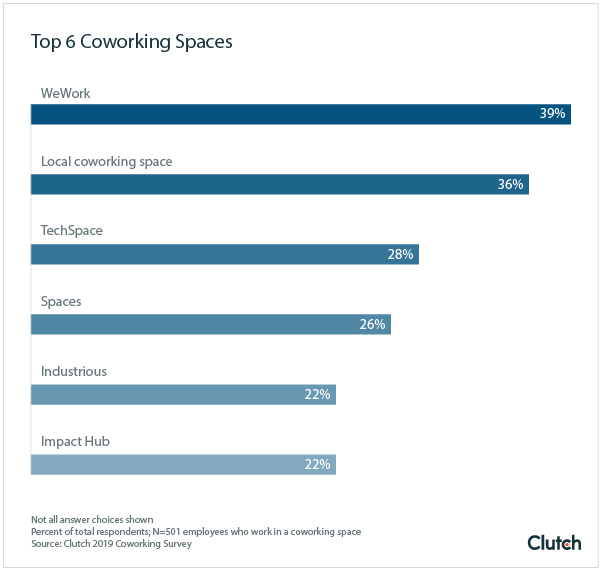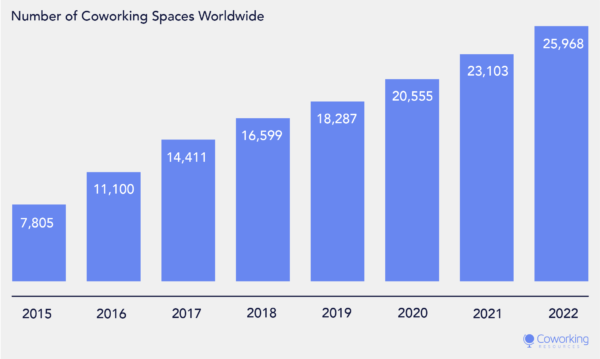WeWork is the world’s most popular coworking space, but its future isn’t bright.
Faced with scandal and layoffs, will the coworking giant throw the brakes on the growth of coworking?
Though it’s too early to tell the full impact of WeWork’s struggles, there is reason to believe coworking is an office trend with staying power. Specifically, coworking offers benefits to both its customers and communities that make it a sustainable trend:
- Growth potential
- Support from municipal bodies
As long as businesses grow within coworking spaces and create local roots, coworking will be a viable office trend.
As WeWork Fails, Local Coworking Spaces Thrive
WeWork loses about $5,200 per customer, or 94 cents per minute during a 40-hour workweek, but its failure does not mean that coworking spaces aren’t profitable.
WeWork’s downfall is due to its own mismanagement. Critics claim that its “bougie” real estate, high-priced snacks, and communal areas that generate zero income are to blame for its giant losses.
Coworking space, however, can be profitable: More than 40% of all coworking spaces currently generate a profit and another one-third break even.
A recent study from Clutch found that smaller, local coworking spaces are now nearly as popular as WeWork. In 2019, more than one-third of coworking employees (36%) operated from local coworking spaces, compared to WeWork’s 39%.
Source: Clutch
A diversifying market signals a positive outlook for coworking, especially as local spaces and models grow in popularity.
Coworking Spaces Help Businesses Grow and Expand
Today’s companies rely on coworking spaces to help them start new businesses, expand current ones, and experiment with new ideas.
Currently, there are more than 18,000 coworking locations across the world, and experts predict that more than 20,000 locations will exist by the end of 2020.
Source: Coworking Resources
As more businesses grow and thrive within these spaces, the more they are able to pump back into the spaces the incubated that growth.
Put simply, coworking spaces now are more than temporary housing for startups. Many businesses stay in coworking spaces for years, even after they’ve grown.
According to Clutch’s research, three-quarters of coworking employees say they have been in their current space for at least one year, and nearly 20% of them have been there for five or more years.
Local Coworking Spaces Stimulate City Economies
Independent local coworking spaces can provide significant benefits to their surrounding communities.
The WeWork business model supports business networking, but local coworking spaces often take things a step further by contributing to their local economies with training and employment opportunities.
Many coworking spaces provide their local communities with a variety of opportunities, such as:
- Business workshops
- Startup weekends
- Hackathons
- Training and mentoring
- Outreach programs in elementary and high schools
As coworking employees build connections with their surrounding communities, the relationship with their city grows.
For example, NextSpace San Jose puts together care packages, called “outreach bags,” for the local homeless population.
Source: Pacific Workplaces
Geekdom San Antonio, for its part, aims to concentrate more talent in San Antonio and has helped to build a vibrant local tech community.
“We want to concentrate more talent in San Antonio,” said Graham Weston, Geekdom’s cofounder, as part of the company’s mission statement. “We want there to be a stronger tech scene downtown and more happening to where people can find a really vibrant community here.”
Growing ties to the community create more trust in coworking, which can improve its appeal for prospective clients.
Coworking Spaces Continue to Grow Despite Uncertainty With WeWork
Despite the downfall of WeWork, many smaller, local coworking spaces are profitable businesses that provide valuable services to local companies and their surrounding communities.
Coworking is here to stay, with many local and independent coworking spaces taking a smarter, more practical approach than WeWork.


